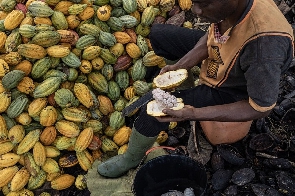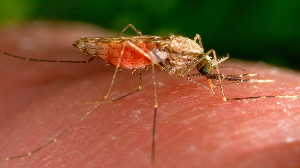Regional News of Thursday, 26 October 2023
Source: kofi offen, Contributor
Improving cocoa yields: COCOBOD trains 100,000 pollinators
As part of measures to improve cocoa yields in the country, COCOBOD has trained 100,000 persons to artificially pollinate cocoa trees.
The work of these persons is to augment the work of the depleted insects causing pollination in the cocoa farms. The insects' depletion according to the COCOBOD was caused by the activities of some farmers. The major cause of the problem is the improper spraying and the choice of unapproved weedicides and insecticides used by some farmers.
Addressing the Chiefs, farmers and the people of the Ahafo Ano North Municipal of Ashanti Region in a mini durbar at Tepa, the Chief Executive Officer of COCOBOD Honourable Joseph Boahen Aidoo advised farmers to make use of the above pollinators. The CEO stated that when this artificial or hand pollination is done well, farmers can reap the benefits of harvesting not less than 20 bags of cocoa per acre. Hon. Aidoo cautioned farmers against the use of unapproved farming practices that affect cocoa yields.
Mentioning pruning as one of the best practices, he encouraged farmers to embrace it as it has proven to be the best method for increasing yields. The CEO continues that, pruning allows ventilation in the farms that contributes greatly to the health of the cocoa farms.
Touching on cocoa pod disease, Honourable Boahen Aidoo, advised farmers whose farms have been affected to contact the COCOBOD district offices for advice. Enumerating measures that have been put in place to fight the disease, the CEO said that COCOBOD will cut down all cocoa trees of the affected farms as the first step of intervention. He continues, that after cutting done these trees, COCOBOD will then plant new cocoa trees in addition to plantain trees at no cost to the farmer. Again, COCOBOD will then manage the new farm for two years before handing it over to its owner.
This measure is to encourage farmers to report and help control the cocoa pod disease which is not curable and can adversely affect cocoa production in the country, according to the COCOBOD CEO. Areas that have been affected by the disease in the Ahafo Ano areas in the Ashanti Region as mentioned by the CEO include Betsiako, Tebrikrom, Wioso, Pobiso, and Jepp Nkwanta.
On the pension scheme for farmers, Honourable Aidoo appealed to them to be enrolled on the scheme. The scheme which he stated is being piloted at New Edubiase in the Adansi South District of the Ashanti Region, is geared towards bettering the lives of cocoa farmers in their old age. He added that, the government has set aside a fund from the sales of cocoa beans for the scheme and that each farmer is already contributing indirectly. The CEO has advised that every cocoa farmer must be enrolled on the scheme to enjoy its benefits.
Speaking at the durbar, the Omanhene of the Tepa Traditional Council, Nana Atwenewa Ampem II, thanked the government for the various social interventions to better the lives of Ghanaians. He mentioned cocoa roads as one of such interventions that has come to improve the rural road network in the country; and appealed that the government expand it to cover more areas. He also appealed to COCOBOD to monitor the activities of produce-buying companies, as some report coming to him indicates that most of them are cheating farmers.
In all, over 800 farmers within and around the Ahafo Ano North municipality participated in the durbar. Among the dignitaries included Heads of Departments and Agencies in the municipality.











